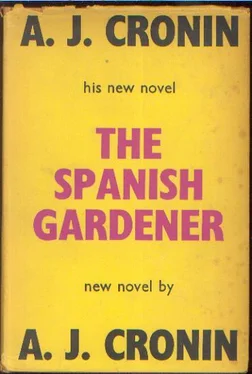Archibald Cronin - The Spanish gardener
Здесь есть возможность читать онлайн «Archibald Cronin - The Spanish gardener» весь текст электронной книги совершенно бесплатно (целиком полную версию без сокращений). В некоторых случаях можно слушать аудио, скачать через торрент в формате fb2 и присутствует краткое содержание. Жанр: Классическая проза, на английском языке. Описание произведения, (предисловие) а так же отзывы посетителей доступны на портале библиотеки ЛибКат.
- Название:The Spanish gardener
- Автор:
- Жанр:
- Год:неизвестен
- ISBN:нет данных
- Рейтинг книги:4 / 5. Голосов: 1
-
Избранное:Добавить в избранное
- Отзывы:
-
Ваша оценка:
- 80
- 1
- 2
- 3
- 4
- 5
The Spanish gardener: краткое содержание, описание и аннотация
Предлагаем к чтению аннотацию, описание, краткое содержание или предисловие (зависит от того, что написал сам автор книги «The Spanish gardener»). Если вы не нашли необходимую информацию о книге — напишите в комментариях, мы постараемся отыскать её.
The Spanish gardener — читать онлайн бесплатно полную книгу (весь текст) целиком
Ниже представлен текст книги, разбитый по страницам. Система сохранения места последней прочитанной страницы, позволяет с удобством читать онлайн бесплатно книгу «The Spanish gardener», без необходимости каждый раз заново искать на чём Вы остановились. Поставьте закладку, и сможете в любой момент перейти на страницу, на которой закончили чтение.
Интервал:
Закладка:
The coast at this point of the journey became broken, indented by many inlets of the sea, and the railroad, cutting inland, made a detour through the foothills of the mountains. Here, if anything, the sultry haze was thicker and, as in a dream, trees, vineyards, and little white farmsteads, mistily obscured, flashed past the Consul's gaze. The track, badly laid, made no pretence of keeping to the level—at one minute the engine tore down a giddy slope while the next, gradually losing its momentum, it panted slowly to the succeeding summit.
In a kind of stupor, the Consul glanced at his watch. Not yet three o'clock. And they had come no more than fifteen kilometres from San Jorge. He groaned inwardly, realizing how much longer this tribulation must endure, and almost furtively he raised his eyes towards the mirror. Yes, they were still sitting in silence, exactly as before. Yet as he peered, from beneath his brows, into the greenish speckled glass, he saw José turn, quietly, and address a brief remark to the guardia . There was an instant's pause, then the guardia nodded assent, and made way for José to rise and pass into the aisle.
The Consul's heart gave a sudden, heavy bound. He saw, of course, that José had asked permission to go to the común and the sudden realization that the youth was now approaching, must brush closely past him, was enough, in his complex state, to set his nerves aquiver. Every cell in his body, reacting tensely, made him aware of José's steady advance. More and more he drew himself together, as if in dread of a violent blow. Yet, even while his flesh contracted, he knew it was not this he feared. No, deep in the dim recess of his consciousness, there formed slowly, and floated upwards, the intuition, veiled yet terrifying, that the moment drawing near was to be, in some strange and tragic manner, a crisis in his destiny.
José, swaying with the motion of the compartment, was now close behind him. Brande could scarcely breathe. He tried to close his eyes, to feign sleep. Impossible. As though compelled by forces stronger than his will, he shifted his gaze and looked directly up at José.
The youth was now slightly in front of him, steadying himself against the end partition, waiting for a momentary aggravation of the jolting to abate. His eyes, dark in his pale face, bore down upon the Consul, searchingly, inscrutably, yet without rancour. It seemed almost that a faint smile was hidden in their depths. Then, quietly, he turned his head away.
The train, having furiously rattled itself downhill to a little valley, was now met by a noticeably steep ascent. As its speed slackened José took a calm step forward.
As he did so, in a lightning stroke of illumination, the Consul guessed the youth's intention. He saw that José was not going into the común but, using this merely as a pretext, was about to jump through the open door of the coach. A sudden convulsion swept over Brande. Apathy fell from him, his breath swelled into his throat, choking him. He must not, he could not permit José to escape. It was dangerous, too, for him to leap from the moving train. Which of these thoughts was uppermost in the Consul's mind, then or later he never knew. At that second, as José jumped, he leaned forward with an incoherent cry and tried to hold him. His hand, clutching wildly, caught the selvage of José's coat. The poor fabric ripped instantly, but the restraint, slight though it was, broke the force and power of José's spring. Deprived of his expected impetus, he lost his balance in mid-air, and failed to land clear. Instead, his body sprawled forward and as he fell, by some fateful, preordained design, his foot was firmly caught between the footboard and the framework of the coach, so that his head struck, downwards, with brutal force, upon the edged metals of the track.
Again the Consul gave out that inarticulate cry. Starting to his feet, he blundered forward, shouted for someone to stop the train. At once a commotion arose, hands tugged the emergency signal. In a daze of nausea Brande heard the train brakes screech in anguish, felt the compartment shiver all over, then grindingly slow down. With a final hiss of steam the train slithered and grated to a standstill, an immobility which was somehow terrifying. Immediately everyone crowded out of the coach, there was a rush of passengers back along the track. Completely alone, the Consul straightened himself in the empty compartment. He must go, he must. Dizzily, he made his way to the exit.
They had freed José. His body lay limp and extended on the green embankment. The clothing had been arranged. Someone had placed a clean handkerchief over the mutilated face. The grass, mountain grass, was soft and green, starred by little yellow flowers. A dear sound of running water reached the ear. It was not far from the river he had loved, the sanctuary he had hoped to attain.
Old Pedro, standing with the watchers, did not look at the Consul. But in a low voice, a broken whisper, he said:
"He will not go to prison now, señor."
Chapter 21
IT WAS nearly ten o'clock that night before the Consul found himself, exhausted and dishevelled, on the sandy lane leading to the Casa Breza. Completely overcome, he had felt unable to travel back to San Jorge by train, and had walked away from the railway line, striding blindly across fields, ditches, and stone walls, heedless of his destination, bent only upon escaping from that fatal scene. After five o'clock he had stumbled into the tiny village of Offerino. Here, from the little post office in the general store, he had telephoned the Consulate. But there was no answer, the place was closed, they had all gone home. Next he had tried to get through to his house, meaning to ask Garcia to fetch him in the car. Yet again he failed: first the number did not answer, then it was engaged, and finally, amidst the inevitable buzzing, was reported out of order.
Normally the inefficiency of the local system was a source of maddening irritation to Brande. Now, however, he left the dark cavern of the shop without a word. They told him that a bus would leave for San Jorge at eight o'clock. Silently, with bowed head and drooping shoulders, he seated himself on a bench outside the whitewashed fonda , refused the inn-keeper's courteous offer of refreshment and, unconscious of the curious glances of the tavern's patrons—simple country people, surrounded by their waggons and beasts, taking their refreshment in the open air—began passively to wait.
Sick, empty, and weak, he found it easy enough to let his weary limbs relax. But his brain, alas, was less quiescent, throbbing crazily, as if to split his skull, spinning an endless web of anguished thought. José dead, wiped out, his young life extinguished … It still seemed impossible to him, yet it was so, there was no escape from that irrevocable fact. Fixing his wandering and almost witless thoughts, he tried to reason that it was an accident … oh, a most regrettable accident, yet one which was quite unavoidable, which he, indeed, had done his utmost to prevent.
But wait … he must not rush, not quite so fast, to that comforting conclusion. Did no one hate José, with a bitter, spiteful hatred, harass and persecute him, drive him to the brink? A soundless groan came from the Consul's lips, a cry of pain, unuttered, wrung from the depths of his being. The arrival of the bus broke only for a moment the torment of his thoughts, barely dispelled that vague reverie which filled his eyes with shadow. Stiffly he clambered into the narrow vehicle, which was almost empty, and sank into the corner with a heavy sigh. When they drove off darkness had begun to fall. His heart beat heavily as they drew near San Jorge.
Now, having left the bus at the head of the lane, he was suffused by an agitation so acute he scarcely dared approach the solitary house. With the advent of dusk the mist had vanished and a wind arisen. Now Brande could hear its muffled drumming through the low cedars on the cliff. It was as though the sky vibrated, stirred by the echoes of a gigantic bell. Ahead of him the path lost itself in the pitch blackness. Although he advanced slowly, the Consul felt out of breath, he had to clench his hands tight to force himself to go on.
Читать дальшеИнтервал:
Закладка:
Похожие книги на «The Spanish gardener»
Представляем Вашему вниманию похожие книги на «The Spanish gardener» списком для выбора. Мы отобрали схожую по названию и смыслу литературу в надежде предоставить читателям больше вариантов отыскать новые, интересные, ещё непрочитанные произведения.
Обсуждение, отзывы о книге «The Spanish gardener» и просто собственные мнения читателей. Оставьте ваши комментарии, напишите, что Вы думаете о произведении, его смысле или главных героях. Укажите что конкретно понравилось, а что нет, и почему Вы так считаете.












